Meyler's Side Effects of Antimicrobial Drugs by Aronson Jeffrey K

Author:Aronson, Jeffrey K.
Language: eng
Format: epub
ISBN: 9780080932934
Publisher: Elsevier Science
Published: 2012-05-16T16:00:00+00:00
Interferon beta
See also Interferons
General Information
Interferon beta is used in the form of natural fibroblast or recombinant preparations (interferon beta-1a and interferon beta-1b) and exerts antiviral and antiproliferative properties similar to those of interferon alfa. Although its efficacy has been debated (1), interferon beta has been approved for the treatment of relapsing–remitting multiple sclerosis, and more recently for secondary progressive multiple sclerosis.
The general toxicity of interferon beta is very similar to that of interferon alfa (2), with no apparent differences between the two recombinant preparations with any route of injection (SEDA-20, 332) (3–6). In multiple sclerosis, fatigue and a transient flu-like syndrome responsive to paracetamol or the combination of paracetamol plus prednisone have been observed in about 60% of patients during the first weeks of treatment, and tachyphylaxis usually developed after several doses (7). Patients with chronic progressive disease are more likely to discontinue treatment because of adverse effects (8).
Clinically relevant adverse effects associated with interferon beta and their management have been lengthily reviewed (9). Interferon beta-1a and beta-1b, the two recombinant available forms of interferon beta, have not been directly compared. From the results of a randomized, crossover study in 12 healthy volunteers, a single injection of interferon beta-1a 6 MU (Rebif) was suggested to produce less frequent and less severe fever than interferon beta-1b 8 MU (Betaseron), but identical pharmacodynamic effects (10).
A flu-like illness is the most common adverse effect of interferon beta. In an open, randomized study of the effects of paracetamol 1 g or ibuprofen 400 mg before and 6 hours after interferon beta injection on interferon beta-induced flu-like symptoms in 104 patients, the two drugs were equally effective (11).
The therapeutic efficacy and adverse effects of subcutaneous interferon beta-1b in the management of relapsing–remitting and secondary progressive multiple sclerosis have been extensively reviewed (12). Interferon beta was considered to be a valuable first-line therapy in relapsing–remitting multiple sclerosis, and potentially useful in secondary progressive multiple sclerosis, although its effects on disease progression is uncertain.
Download
This site does not store any files on its server. We only index and link to content provided by other sites. Please contact the content providers to delete copyright contents if any and email us, we'll remove relevant links or contents immediately.
| Administration & Medicine Economics | Allied Health Professions |
| Basic Sciences | Dentistry |
| History | Medical Informatics |
| Medicine | Nursing |
| Pharmacology | Psychology |
| Research | Veterinary Medicine |
Tuesdays with Morrie by Mitch Albom(4776)
Yoga Anatomy by Kaminoff Leslie(4359)
Science and Development of Muscle Hypertrophy by Brad Schoenfeld(4133)
Bodyweight Strength Training: 12 Weeks to Build Muscle and Burn Fat by Jay Cardiello(3963)
Introduction to Kinesiology by Shirl J. Hoffman(3767)
How Music Works by David Byrne(3262)
Sapiens and Homo Deus by Yuval Noah Harari(3068)
The Plant Paradox by Dr. Steven R. Gundry M.D(2615)
Churchill by Paul Johnson(2579)
Insomniac City by Bill Hayes(2546)
Coroner's Journal by Louis Cataldie(2476)
The Chimp Paradox by Peters Dr Steve(2383)
Hashimoto's Protocol by Izabella Wentz PharmD(2371)
The Universe Inside You by Brian Clegg(2131)
Don't Look Behind You by Lois Duncan(2127)
The Immune System Recovery Plan by Susan Blum(2057)
Endure by Alex Hutchinson(2023)
The Hot Zone by Richard Preston(2015)
Woman: An Intimate Geography by Natalie Angier(1938)
